Heart: The City Beneath by LazyAngel
An Introduction
Original SA post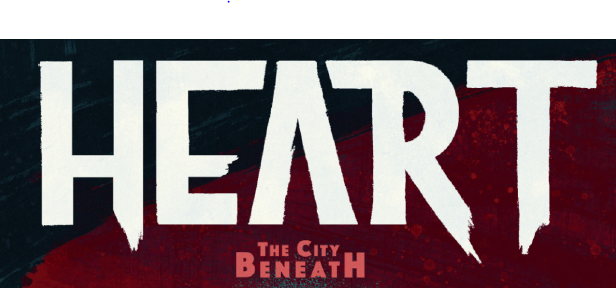
Heart: The City Beneath
01 - An Introduction
Heart is an rpg by Grant Howitt and Chris Taylor, a sequel of sorts to their previous game, Spire, a game of murder and covert rebellian, which I reviewed in this thread some time ago. Heart's their newest release (PDFs dropped on the 1st of April), and it works as both a kind of sequel to Spire, and as a second iteration of the core mechanics. My review of Spire was a bit of just a read-through, but I've been running it for my ground for a bit, and so I'll see if I can add in my observations about Heart as I go.
Before I start, however, I'd like to point out that if anything here immediately grabs your interest, the game itself can be bought here, or the (free) quickstart rules can be found here. The creators also have a podcast; Hearty Dice Friends, which is well worth listening to. Oh, and the excellent layout design was done by our very own Flavivirus, so you'd be supporting goon-adjacent projects there!
So what's it all about? Whereas Spire concerned itself with the titular mile-high city, Heart goes deep beneath, down towards the crack in reality that sits under the city - bad enough at the best of times, but when enterprising engineers tried to use it as the basis of a mass transit system, things went from bad to worse. So it's delving deep into the earth, rather than conspiring against the powers that be, and the PCs are the kind of people who'd end up doing this for a living; the obsessed, desperate or forced.
Next: I'll give an overview of the system
Game Mechanics
Original SA post
Heart: The City Beneath
02 - Game Mechanics
So the mechanical underpinnings of Heart haven't changed much from Spire, it's mostly a matter of clarity, and a bit more consistency. I'll note significant changes here in italics.
Characters in Heart have four elements that tie directly into the core mechanics - Skills, Domains, Knacks and Stress tracks.
Skills are the things a character can do well, and are binary - you either have them, or you don't. There's only nine of them, and given that characters will generally start with only a few (at least one, could be up to three or four at absolute most), you end up pretty specialised. The nine skills in Heart are Compel (persuasion and intimidation of any kind), Discern (general perception), Endure, Evade, Hunt (track stuff down), Kill, Mend (healing bodies, fixing equipment) and Sneak (all kinds of stealth).
Obviously the main change is the available skills are mostly different, with the exception of Sneak and Compel. Heart doesn't have nearly as much of an emphasis on social interaction as Spire, and characters are generally much more pragmatically-focused - see Kill and Endure instead of Fight and Resist, for example. Also Heart PCs are much, much more focused than Spire PCs - a character in the latter can easily get up to 4/5 skills at creation.
Domains are also areas of experience, and you also either have them, or you don't, but they're broad categories relating to different areas of the Heart (and the things that live there). The seven Domains are Cursed (places the Heart directly touches), Desolate (wastelands, abandoned settlements), Occult (any hidden or arcane lore), Religion, Technology, Warren (cramped spaces, twisting corridors), Wild (general flora and fauna). Once again, you're not likely to have more than one or two at character creation.
Once again, characters are a bit more focussed here, with respect to Domains, and this helps, I think, define party roles a bit more cleanly. Obviously the Domains are very different, due to the very different setting, and I feel there's considerably less overlap between them in Heart.
Knacks are very-specific specialisations that you pick up if you end up getting a given skill or domain a second time, or from certain class abilities, and are usually player-defined.
No change from Spire, but Knacks are often handed out in class advances in lieu of giving access to entire Skills or Domains.
So how do these go together? Whenever a roll is called for (and we're talking for actions that are important and/or challenging), you assemble a dice pool of one to four d10, roll them, and take the highest value, applying the result on the following table;
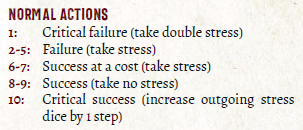
When situations are even more fraught, a roll can be considered Risky or Dangerous - removing the highest one or two results from the rolled pool, further reducing the chances of success (if you'd end up having no dice left, you only roll one dice, and can only succeed on a 10, albeit at a cost).
This is generally unchanged from Spire, but difficulty removes dice after the roll, making higher difficulties much more dangerous. Also, in Heart you can't have difficulty 3 rolls or higher, they're just rated as impossible.
So... Stress is the consequences of failing rolls, or succeeding only at a cost. It's also what you inflict on opponents or situations when you roll well, and it's inflicted either way by the roll of a dice; from d4 to d12, with some effects adjusting the dice type up or down (notably, rolling a critical success). Generally, something not particuarly dangerous causes d4 stress, using appropriate gear tends to inflict d6, and exotic weaponry and specialised tools deal d8 and upwards.
For NPCs, stress is generally applied against a single resistance value - once this is gone, the NPC is defeated/driven off/successfully persuaded. The same goes for less animate obstacles - notably forging a route between various landmarks of the Heart. For players, however, stress is applied to one of five tracks; Blood (physical injury and exhaustion), Mind (madness and coping with weirdness), Echo (the Heart's twisting and corruptive effects), Fortune (luck, over-confidence and incompetence), and Supplies (loss of resources, broken equipment, debt).
Players and NPCs will sometimes also possess a Protection value (for PCs this is tied to a single track). This simply reduces the amount of stress suffered by the amount of protection (this is usually no more than one or two points though).
Obviously, stress tracks have changed - Reputation and Shadow are gone, replaced by Fortune and Echo, and Silver has been changed to the much more survival-orientated Supplies. Protection replaces the extra resistance boxes in Spire - a static armour value ends up being far less confusing than having extra boxes that don't count for fallout.
Now Stress on its own doesn't do anything. It's a pain to get rid of - I'll go into that later, but it generally requires the sacrifice of various resources, or some class abilities to get rid of it. The other way to shed stress is to suffer Fallout. Whenever a PC takes stress, the GM rolls a d12 (note that this, and inflicting stress are pretty much the only time the GM actually rolls). If this is equal or less than the total amount of stress the character has, they suffer Fallout - if this roll is 6 or less, then it's Minor, 7 or more and it's Major (much more consequential). The former is generally easier to deal with, and the effects aren't too dehabilitating; many don't have any real mechanical effect.

Minor Blood Fallout
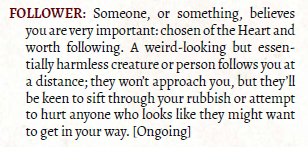
Minor Echo Fallout
The latter start getting much more serious, causing ongoing stress, or locking away a character's Skills and Domains until they can be cleared, either through spending resources in a safe place, or certain magic.
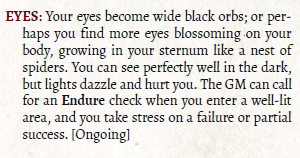
Major Echo Fallout
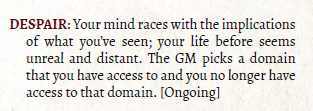
Major Mind Fallout
When you take Minor Fallout, it at least clears all stress from the associated resistence track. Major Fallout clears all your stress. Two Minor Fallout effects can be combined (with the agreement of player and GM) into a Major Fallout. Likewise, if the player accepts it, two Major Fallouts can combine to result Critical Fallout - this means that the character will shortly die or otherwise leave the campaign.
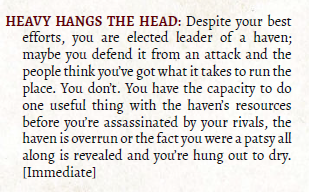
Critical Fortune Fallout
Certain locations and NPCs will inflict their own fallout as well, not linked to a specific stress track.
So, in my opinion, Fallout is much more interesting and varied in its effects than Spire. Also, a Heart PC will never die unless the player agrees to it - there's much more explicit narrative power in the hands of the players here; something that we'll see again when we get to advancement. Plus there's huge story potential in many of the fallout effects, and some Minor Fallout explicitly leads to specific Major and Critical Fallout.
So that's it (messily) for the core of the system.
Next: Character Creation Part 1 - Ancestries and Callings
Character Creation - Ancestries and Callings
Original SA post
Heart: The City Beneath
03 - Character Creation - Ancestries and Callings
It's been brought to my attention that I am in fact completely wrong regarding the distribution of Skills and Domains in Spire as opposed to Heart, and I must apologize for that. It still remains that generally, a starting Heart character will tend to have less than a starting Spire character (2 + max of 3 from Minor abilities, as opposed to 4+ from Class and Durance, plus possibly another one from the starting advance), but as the game goes on, Heart characters tend to pick them up just as quickly.
Don't know where I got the bit about Knacks from either - if anything, Knacks in Heart pretty much require double-purchase of a Skill or Domain, or are entirely transitory, which is a lot cleaner than Spire where you tend to end up with a handful of them.
Annnyway, character creation! It's pretty simple;
- Pick an Ancestry - are you Drow, Aelfir, Human or Gnoll?
- Pick a Calling - the reason you're down here in the first place.
- Pick a Class - the tools you'll use to survive (or not).
- Choose three Minor Abilities and one Major Ability from your class.
- Answer one (or more) of the questions from your Ancestry, and all the questions from your Calling.
I'll cover the first two in this post, as they're pretty simple, although the Callings are a brilliant bit of game design, and I'll tackle Classes over the next few posts as they're a bit more meaty.
On a surface level, Callings sit in the same conceptual space as your Durance as Spire, but they tie in to the advancement system in Heart and are much more a driver of character behaviour, as well as a narrative tool players can use.
Ancestries are just that. Whereas in Spire most PCs would be Drow as a matter of course, Heart broadens the options to allow for Human, Gnoll or even Aelfir as player characters - when you're making your way through a nightmarish semi-sentient hell-dungeon, race and skin colour become decidedly secondary considerations. When you're in a Haven (a slightly-more-safe refuge built around a stable landmark) there might be a bit of prejudice, but that's as likely to be about where you're from as whether you have fur or pointed ears. All ancestries have a choice of three questions the player can answer one of to flesh out the character a bit, as well as a d20 table to generate a couple of trinkets they start with, but no other mechanical effects.
Drow are the same as in Spire - monochromatic elves who blister at the touch of the sun and worship a triple Goddess of the Moon. They're the underclass (and former rulers) of the city above, and are often driven down into the under-city for a multitude of reasons, from escape from the regime above, to pilgrimage to the Temple of the Moon Below.
Humans in Heart/Spire have a reputation for digging up the past, often working as retro-engineers and tomb-robbers. They also invented guns, and, shortly after, the arms trade. So ending up in the semi-permeable reality below the city isn't an entirely unusual fate. Also they're canonically mostly welsh or cornish.
Aelfir, the High Elves are the masked rulers of the City Above, alien with bizarre and baroque customs and tradition. But sometimes they too fall, and by the point they've ended up in the City Below, they've adjusted to no longer being on top of the heap.
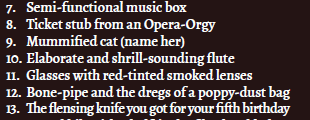
Gnolls are the hyena-headed people of the far south; a nation with advanced technology built of their mastery of demonology, that's currently fighting an on-off war with the Aelfir. So in Spire, where their presence is generally forbidden, they tend to gravitate to the under-city.
Obviously although Spire brought up the idea of being a disgraced Aelfir or a human, the emphasis was on playing only Drow and playing within the bounds of that culture.
Callings are where we start to see some mechanical meat to the character. There's five of these, each corresponding to a different reason for a character to find themselves in the City Below. Callings give you four things; a Core Ability, three questions to answer about your character and how the Calling brought them out of the City Above, another random trinket table to flesh out your character and a list of Beats.
Beats, which come in Minor, Major and Zenith forms are the core of advancement in Heart. They're little milestones in your character's story, and advancement is simple; you choose two at the end of each session (and at character creation); if you trigger the circumstances of each beat (usually taking fallout or doing things that get you in trouble), you get a Minor/Major/Zenith advance and check off the beat. Once you've hit a given beat you can't choose it again.
This is so much clearer than Spire's advancement, and gives the player the opportunity to say "next session, can I have the chance of X happening?". Note that Zenith Abilities generally result in the death/retirement of the character so picking a Zenith beat is a signal to the GM to say "I think my character's arc is approaching a logical end". In fact this is one of the better RPG experience/advancement settings I've seen.
Here's the five Callings;
Adventure. You're so jaded that only in the living nightmare of the City Below can you really feel alive. Has the core ability Legendary which lets them remove stress whenever they hit a beat. Minor beats involve taking risky or dramatic actions; taking major fallout for example, getting into trouble with the authorities or having things named after you. Or kicking someone off a tall building. Major beats are more conventional heroism; slaying a might beast, saving a Haven, hiring a bard to sign of your exploits. There's two Zenith beats, either lead a Haven to prosperity, or reach Tier 4 of the Heart (more on that when we get to delving, but that's entering the Heart itself).
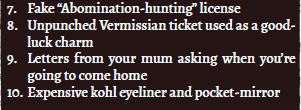
Enlightenment. They all said you were mad! You'll prove them wrong! You're on a quest to prove that something that other have told you was impossible, isn't. Core ability is Unorthodox Methods - once a session automatically succeed with a 6 (succeed but take stress). Minor beats revolve around the pursuit of knowledge despite the risks (or the destruction of knowledge that contradicts your theories). Major beats involve sacrifice - either personal, or of others - whilst pursuing your theories.
For your Zenith beat;
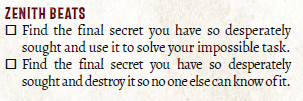
Forced. You don't want to be down here, but you've not been given a choice.
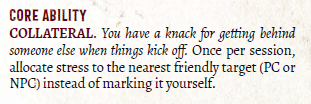
Minor beats revolve around either your relationship with your masters, how their orders make your life harder, and forging a life outside of their control. Major beats involve either directly fighting back against the powers controlling you, or carrying out their orders with significant consequences. The Zenith beat is simple; either escape your master's control, or enact your bloody revenge.
Heartsong. You've heard the sweet song of the heart and are now drawn towards its fleshy red embrace. Your core ability is In the Blood - you gain Echo protection, and once a situation (i.e. a discrete scene), you can allocate stress to Echo instead of another resistance. Minor beats involve sacrifice, and taking the Heart into your body by eating things it creates, or graft parts of the flora and fauna of the City Below onto yourself, as well as seeking to strengthen your connection with the Heart itself. Major beats go further, tearing down Havens, or spreading your visions. And in the end you'll either become one with the Heart, or tear its connection to you from your body, severing the link.
Penitant. You caused harm to your organisation through either malice or incompetance, and now seek to make amends by delving into the City Below.
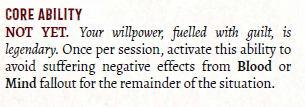
Minor beats for the Penitant involve making penance for your crimes, and punishing others for their transgressions as well as performing acts to re-establish your bonds with your order or organisation. Major beats either escalate these stakes, or add ambuguity - further crimes you seek to hide from your order. Finally, for your Zenith beat you either find forgiveness from your order, or you betray them, intentionally this time.
So quite a mix there; generally players should have an idea of what Zenith beat they're ultimately working towards after a few sessions of play. This does also put a bit of a time limit on a campaign of Heart - it's not intended to run past around a dozen sessions or so before all the characters have been retired one way or another, but this is hardly a flaw - it lets the game focus on the narrative of the group, rather than serving as an open-ended sandbox.
Next: Character Creation Part 2 - Equipment, Resources and our first class; The Cleaver
Character Creation - Equipment, Resources and the basics of Classes
Original SA post
Heart: The City Beneath
04 - Character Creation - Equipment, Resources and the basics of Classes
So, before I dive into the good bits (i.e. the classes, which are every bit as fun as those in Spire), I thought I really should go over equipment and resources. The book deals with them after the classes section, but there's quite a bit of interaction between the resource system and PC abilities, so it makes sense to talk about them first.
Equipment
This is anything that can augment character's rolls; usually by letting them inflict or heal more stress than the basic d4. It falls into three main categories, each tied to a Skill;
Kill equipment is all weapons, which have a die value (d6 for run of the mill stuff, d8 for the good gear, d10 or d12 for exotic or legendary weapons), and a list of tags, such as Ranged (self-explanatory) or Dangerous/Expensive/Distressing/Loud/Wyrd which inflicts d6 Blood/Supplies/Mind/Fortune/Echo stress on the user if you roll the maximum stress.
Delve equipment is used for going from place-to-place in the Heart. Inflicting stress on a delve is how you make progress through the ever-changing terrain of the Heart, so delve equipment includes anything that helps you get from Point A to Point B, without ending up at Point Z.
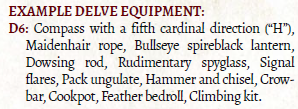
Obviously not all delve equipment is applicable to every situation, but otherwise it generally behaves like Kill equipment - including having tags that limit or augment their use.
Finally, Mend equipment can be used to remove stress from a character's resistances, at least Blood (bandages, surgical gear), Mind (drugs, mostly) and Supplies (scavenging, good delving supplies, spare materials). Fortune and Echo stress is much harder to get rid of, short of suffering Fallout, and can often only be reduced at a Haven.
In addition to this, the GM might hand out unique or single-purpose gear that won't directly inflict stress. This generally gives access to a Knack rather than having a dice type or any tags. A final note is that there is no armour in Heart - the most you can get is a single piece of equipment with the Block tag, which gives +1 Blood protection - it's assumed all characters have protective gear anyway, and armour is baked into the class abilities.
Equipment is much more formally defined in Heart than in Spire, and in the latter most of your Blood protection came from armour rather than class advances. The addition of more game-facing mechanics makes sense given the focus of each game - in Spire, your gear is mostly cosmetic, plus whatever weapons you're carrying, whereas in Heart a delver's equipment is of paramount importance. You go into the Heart ill-prepared, and things are not going to go well.
Resources
Like Equipment, characters will also amass Resources. Like Equipment, each item of Resources has a dice associated with it, representing value and/or rarity - d4 is common, d8 is rare, d12 is unique or remarkable items. Resources, however are also linked to a specific Domain - a Haven d6 resource might be a pouch of coins, whereas an Echo d8 resource might be the organs of a Heartsblood beast, or scrapings of the edritch mould growing on the walls of a long-abandoned Vermissian station. They may also have tags, often acting as hooks for Fortune fallout to trigger - Fragile resources might get damaged, or you might find it hard to shift a Taboo resource.
Mostly, characters will find, scavenge or steal resources from the people, creatures and places they find on their travels. They're spent on character abilities, to buy new equipment, or to remove stress - although whether the aforementioned bag of coins, or a string of teeth stolen from a graveyard is more useful depends on who you are, or where you're trying to buy stuff. Most doctors will take cash or medical supplies for example (usually Haven), but some more unusual services will accept more unusual resources as payment.
The resources system is entirely new to Heart, along with a better indicator of how to buy/sell gear - once again this makes more sense in a game which is focussed around what is essentially dungeon delving.
Classes
The good stuff! Whereas Callings are why your character is even in the City Below, and how their arc will progress, Classes give them the set of tools they'll need to try to survive the experience. They're pretty simple in practice; your class gives you one Skill, and one Domain, some starting equipment and resources, as well as one or two Core Abilities, which are key to the class's flavour and mechanics. Finally, you'll pick three Minor Abilities - small advantages and improvements, and one Major Ability, which is more character-defining. The latter also each have three Minor Abilities that can be taken to customize them further, and are alot more varied in how they impact play.
Standalone minor abilities are pretty simple, and there's some similarities between classes. Each class has a total of thirteen to pick from, included three semi-shared abilites, which grant either a Skill, a Domain, or +1 Protection to one of four of the resistance tracks (the missing one varies by class). These can all be taken more than once, and are generally not as good as the more unique abilities. Next, every class bar one (the Hound) has two Minor Abilities that each give +2 to a resistance - the 'strong' resistances for that class.
The rest generally each give two things; usually a Skill, a Domain, or +1 Protection, plus a unique perk. The Minor Abilities attached to Major ones are less formulaic, and tend to alter how the Major functions, although some grant semi-related perks instead. But enough of this, and on with the classes (next time)!
Classes in Heart are far more 'balanced', both in game terms and narrative weight, and Abilities seem rather more substantial than Spire's Advances. The Major Abilities in particular are nicely customisable, and sit somewhere between Spire's Medium advances (for the Major alone) and High advances (once you have all the modifiers). Also the +1 Skill/Domain/Protection advances have been codified as abilities, and each class has one Protection value they can never increase through a repeatable buy.
Next: The Cleaver, Deadwalker and Deep Apiarist
Classes - Cleaver, Deadwalker, Deep Apiarist
Original SA post
Heart: The City Beneath
05 - Classes - Cleaver, Deadwalker, Deep Apiarist
So, now we get to the classes themselves. As well as a run-through the the class, I'll drop in a link to the design post Chris and Grant did over the months since the Kickstarter, as frankly they've already said most of what there is to day about the actual mechanical design, although some of the classes have moved on quite a bit since they were written.
The Cleaver
This is what you get if you take a D&D-style druid (with a touch of ranger) and shove them into the Heart (with a side-track into Monster Hunter). They're the ones who head out into the wilds of the City Below, pathfinders and scouts through the nightmare. They change themselves through illicit surgeries, taking a little bit of the Heart into their own bodies, giving them strange and unusual abilities.
Cleavers start with Hunt and Cursed, along with a hunting knife and either a cleaver, bow or crude medical gear. They have two Core Abilites; Heartsblood gives them a minimum protection value for all resistances equal to the Tier they're currently on (0 for the City Above, 4 for the Heart itself), making them tougher the deeper they go. The Red Feast lets them eat a resource to gain the domain associated with that resource (particuarly toxic or non-palatable items need a roll), or a knack if they already have the domain. So they've already got the tools to let them survive pretty well anywhere.
A Cleaver's minor abilities follow the common pattern; notably they can't get Mind protection through any of their class abilities - the path they take isn't conducive to sanity. Other abilities give them keener hunting instincts, natural weaponry or the ability to command simple animals.
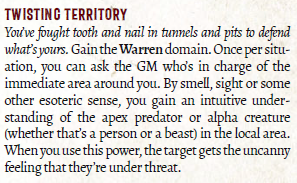
The Cleaver's Major Abilities are; Bloodbound Beast - basically a cryptid animal companion, Chimeric Strain - wild-shape, basically; hulk out by taking Echo stress, Extinction Bow - gain a Monster-Hunter scale bow/siege weapon which can be upgraded to fire harpoons, Monstrous Appetite - heal from using The Red Feast and The Wild Hunt which lets you lead a group hunt or delve.
As for the Zenith abilities, either you end up slaying the Beast; the Ur-creatue lurking deep within the heart, or maybe you die and the primeval Forest rushes in, creating a new landmark at your grave. Or maybe...
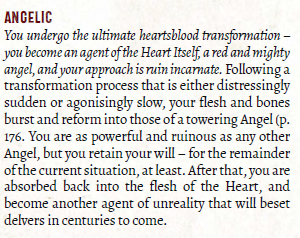
Cleaver Class Breakdown
The Deadwalker
Another ranger-analogue, with a touch of rogue, the Deadwalker is someone who nearly died, but for some reason didn't quite and now has their death sitting in the back of their head giving them (terrible) advice. Oh, and the ability to break back into the afterlife if needs be. They get Delve and Desolate and tTheir Core Abilities are Enter the Grey which lets them enter the space between the worlds of the living and the dead and move unseen and unheard, and...
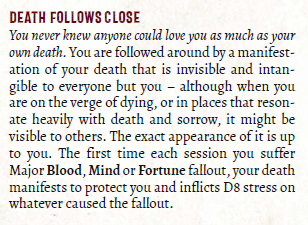
Like the Cleaver, they can't get Mind protection. Their Minor abilities let them hunt prey they've marked, wield their death as a (one-shot) weapon or extinguish nearby light sources. Their Major abilities are Descent - using the Grey to break into one (or more) of the eight Heavens, either though ritual or brute force, Echoes which lets them see a ghostly recreation of the past, Invidious Spectre - their death manifests as poltergeist activity, Reaper's Strike - give up Blood protection to add it to stress inflicted and Sudden Death which let's them dive into the Grey without the prerequisite rituals.
When they acheive their Zenith, it goes one of three ways, all of them fatal for the Deadwalker; they can draw a place, person or concept into a physical vessel, killing themselves and it in the process, drag a target into the Dark Place, dying in the process, or just die, tearing open a door to heaven and causing spontaneous miracles in the area (basically a full heal and massive buff to the rest of the party). They always go out with a bang.
Deadwalker Class Breakdown
The Deep Apiarist
Do you like bees? Do you like little agents of order so much you would welcome them into your sinuses to make your body a hive-machine, to fight back the power of the Heart? That's who the Deep Apiarist is. They're a bit of a wizard/priest type; more of a support character than a straight-out combatant (unless fighting Heart-tainted creatures that is).
They start with Mend and Occult and can never gain Mind protection - but this hurts them less than you'd think as they have The Hive; they automatically remove all Mind stress at the start of a situation and can never get rid of it any other way. They can also Release the Swarm, basically shooting bees at people.
For Minor abilities, they can improve their ability to mend and heal (even if they don't have the right tools), cause someone to revert to their base impulses, see through the eyes of their hive, or even use the bees to highjack wild animals. Or have the swarm chew them up and reassemble them in order to pass through small gaps. The body-horror is much more apparent in this class.
Their Major abilites include Blessed Toxin - secrete a healing narcotic and deliver it via a sting, Delirium Spike which boosts the use of their swarm as a weapon, Sacred Geometry - when you roll a 6 to inflict or remove stress, add another d6, Unchaos - coalesce probability, reducing the difficulty of actions, and...
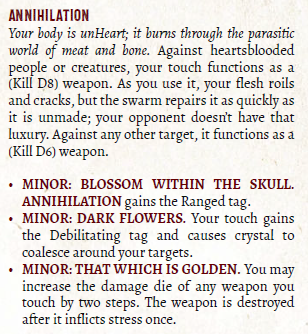
The end of a Apiarist's arc can lead to them entombing themselves and a taget in perfect, eternal crystal, dispersing into a cloud of bees which will spread your consciousness across a Landmark, warding it from the Heart, or surrendering to chaos, and manifesting the Heart itself (fatally for the Apiarist, and likely everything around you).
Deep Apiarist Class Breakdown
Next: The Heretic, Hound and Incarnadine
Classes - Heretic, Hound, Incarnadine
Original SA post
Heart: The City Beneath
06 - Classes - Heretic, Hound, Incarnadine
The next three! A bit less body-horror in this batch.
I'll probably keep the D&D analogues for each class, as those are kind of our archetypical dungeon-delving roles, and the Heart is nothing if not a massive dungeon. Plus Grant and Chris have done something similar to Kieron Gillan's Die in that they've subverted the traditional party roles in interesting ways.
The Heretic
Within the City Below continues the traditional Drow worship of the Danmou; their triple-goddess of the Moon, now (mostly) outlawed in the City Above. Close to the Heart, however, this worship has twisted into belief in a Moon Below, of which the one hanging in the sky is a pale reflection. Priests and healers, they follow a syncretic religion which worships all three faces of the moon in a way that would likely now be unrecognisable in the Spire.
Heretics start with Mend and Religion as you might expect, and tend to take more of a healing/supportive role in a party of delvers (although they can power up for combat very effectively if they need to); they're literal clerics, just a little strange. Their single Core Ability is Ministrations - they can lead a group in a ritual that will clear Minor Blood or Mind fallout, or reduce Major fallout to Minor, but it takes time (and makes a Delve harder if you're part-way through).
Their Minor Abilities let them grant protection to their allies, and interact with the devout of the Moon Below, as well as seeing in the dark, or discrening lies (it's a bit of a grab-bag). As with other classes, they can improve their protection against four kinds of stress, and although they don't have a repeating way of boosting Blood Protection, other Minor and Major abilites grant it, making the Heretic pretty tough in the long run.
The Heretic's Major abilities represent five of the six virtues of the Danmou (the sixth, Grace, is missing, possibly stolen by the Aelfir). Oath of Community lets you reduce the effects of Blood fallout and stress, both for yourself and your allies. Oath of Fury is more aggresive, letting you augment your killing abilities considerably, although failing to make a worthy kill causes Mind stress.
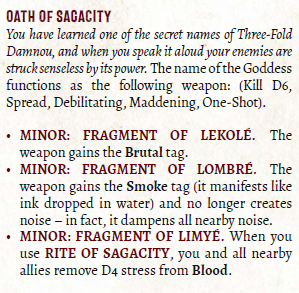
Oath of Tenacity increases the stress you deal for Risky or Dangerous rolls, Rite of Vigilance lets you see the souls of nearby creatures, even through obstacles.
When they hit their Zenith, they may ascend as an Angel of the goddess, taking on great powers for a scene before being ossified into a bone-crystal statue, look upon the Goddess herself, become a beacon to the faithful and converting the secular (and triggering an elite kill-team of Aelfir Paladins to come mobilise and hunt you down), or die a martyr's death, creating a holy landmark where you've fallen.
Heretic Class Breakdown
The Hound
Long ago, a mad Aelfir general sent the nine-hundred men of the 33rd down into the City Below in an attempt to pacify the Heart. A mere three hundred survived, cut off and besieged. In order to save the remaining troops, the officers did something terrible, and forgotten. The Hounds are those who bear the badges of those three hundred, protectors of all who draw breath in the City Below.
The first of the two 'fighter' types, Hounds are somewhere between a Western lawman and Sam Vimes, with a touch of secular Paladin. They start with Hunt and Haven, and their single core ability is In The Thick of It - once per scene they can mark stress to Fortune in place of another resistance, and when they're hit with Fortune fallout, they roll with Mastery for the entire scene.
Minor abilities let them survive the inevitable perils the Heart will throw their way, ferret out injustice, force themselves to be the center of attention, or just find a safe place to hole up and gain a brief respite. True to their nature they never get Fortune protection - Hounds are never lucky, but are otherwise pretty hardened to the more mundane dangers of the Heart.
Their Major Abilities are Condemn - declare somone a wanted criminal, Forewarned and Forearmed - spend time to prepare for coming challenges, Stare Down, where your gaze becomes a weapon (it doesn't kill, just terrifies and demoralises), Trench-Fighter - you know how to hit where it hurts, and Unstoppable - when you're hurt, you're even more dangerous.
At their Zenith, they either transform to become the original owner of their badge, eternally standing watch over a landmark, or resort to destroying their badge, freeing the 33rd to act out their final moments (destroying the landmark you're in in the process). Or they can become a...
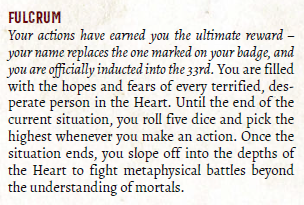
Hound Class Breakdown
The Incarnadine
In the City Above, fortunes wax and wane, and sometimes someone will find themselves entirely indebted to their creditors. Rarer still is it to be so catestrophically in debt that you attract the attention of Incane, the Crimson God. Parts of your life and memories have been repossessed, and you bear Incarne's mark as one of their priest-merchants, wielding the metaphysical force of your own debt.
Incarnadines get Compel and Haven as their starting skill and domain; they're merchants at heart, unscrupulous and desperate. Essentially, the nearest D&D role is the Bard - they've got a lot of utility, and make good faces, but aren't stand-up fighters, along with a touch of the rogue. They don't know what you need - they just make you think you want it. They have two core abilities; The Cost of Doing Business lets them consume a resource, roll and set aside its dice to use when they perform a later action or inflict stress. Also, if they go down, they explode;
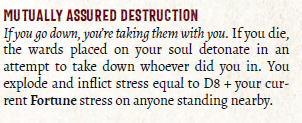
Their Minor Abilities are largely based around trade and exchange, hurting those who've shed your blood, manipulating (or stealing) resources, and getting away from those you've wronged in turn. They can never get Blood protection, however - they're never going to be front-line fighters, although they'll happily knife someone in the back, literally and metaphorically.
Incarnadines get the usual five Major Abilities; Backstab gives them a nice combat punch against unaware targets, Broker lets them pray to Incarne to remove stress from another (and eventually trade fallout), Crave instills a great desire in the target, Debtor's Reds - the holy robes of Incarne - inflict stress on your enemies whenever they see you act, and Karmic Ledger let's you know someone's deepest Karmic debt, and use it to your advantage. Finally Network lets you start to build out an actual trading network through the City Below, reaping resources as you do. (Theoretically, Heart is a traingame after all...)
Their Zenith rewards are interesting. Either receive a favour from Incarne, being able to buy anything; physical, conceptual, whatever, but it'll cost your life (a couple of sessions later), or wield the weight of Incarne's own Debt against a target - you also use it to clear your own stress, but there's a 10% chance each time that this will kill you. Or finally, you can pay off your debt. Unlike all the other Zenith Abilities this doesn't benefit your party in the slightest; it's the single selfish one. But it does mean you can go back to a normal life, dying decades later surrounded by your loved ones.
Incarnadine Class Breakdown
Next: The Junk Mage, Vermissian Knight and Witch
Classes - Junk Mage, Vermissian Knight, Witch
Original SA post
Heart: The City Beneath
06 - Classes - Junk Mage, Vermissian Knight, Witch
Now into the home stretch, with what are possibly my three favourite classes. An interesting thing to note is that nobody gets Kill as an automatic skill, and I quite like this - it's easy enough for pretty much any class to pick up the skill, but there has to be a conscious decision on the player's part. After all, your class skills reflect what you're doing day-to-day, and even the Cleaver, Hound or Knight are Hunting or Delving as a day job. Pretty much no-one is a Killer by profession (even a hitman would probably have Hunt or Discern instead).
The Junk Mage
There are great and powerful entities out there, beyond the world that we see and feel, and the Junk Mage has learnt to tap their power; stealing or bargining for mana from alien minds. They're basically half-mad magic-junkies, scraping together spells from bits of dream, half-formed true names and theoretically thaumaturgy, riding the bleeding edge until they burn out.
Very much Heart's warlock analogue, Junk Mages start with Discern and Occult (pretty much as you'd expect), and a small selection of esoteric or just plain unsubtle weaponry. Their core abilities are Ravening Knowledge - they roll with mastery to cast spells when they have four or more Mind stress, and Sacrifice - they can destroy an Occult resource to protect from spell-casting backlash. As long as they can keep themselves just unbalanced enough, they can work wonders.
Minor abilities for the Junk mage play up their packrat habits, letting them fix and improve their gear (making it more dangerous to use to boot), smell magic or avoid attention. Or just carry a whole lot of random arcana;

As could be expected, they can never get Mind protection - they embrace the insanity rather than hardening themselves against it.
Major abilities are all spells, invoking one of the entities the mage is bound to/stealing from; the Minor abilities associated with them tend to grant access to additional spells, or alternative uses of the major ability. Curse of the Sky Court taps into an exiled fae court of the air, throwing those nearby into an orgy of hedonism. Frenzy of the Sky Court channels their mercurial energies instead, gaining protection, but hindering actions that need concentration. Greed of the Red King invokes an ancient spirit of greed and flame, letting you smell worth and see want.
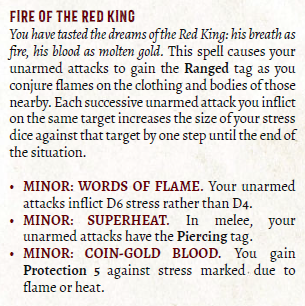
Kiss of the Drowned Queen summons the power of that ancient Eel-queen, conjuring salt water into the lungs of a target. Sanctum of the Stone Chorus opens a path to a temple of the Old Gods; imprisoned parasite-deities which can remove Echo stress (and other forms of stress with upgrades).
The Zenith abilities entail making a pact with one of these entities. Summoning the Red King, and either being added to his hoard or taking his place. Becoming the advisor to the Drowned Queen; her most loyal subject until you end up mad, assassinated or taken as her latest spouse. Or opening the prison of the Stone Chorus, adding your target as another captive. You become part of the lock on the door, however.
Junk Mage Class Breakdown
The Vermissian Knight
The Vermissian is a wonder of engineering, a public transport system designed to grant free and easy access to all parts of the Spire. But the original engineers decided to use the Heart as a source of occult power, and everything went horribly, horribly wrong. The infrastructure is home now to the deranged and the desperate; heretics and fringe historians. The Vermissian Knights are the guardians of those who live in and near the tunnels and stations - often the largest pockets of civilisation in the City Below. Wielding good steel, and armoured scavenged from feral locomotives, they are a symbol of protection and order.
A tank, pretty much literally, the Vermissian Knight is probably the toughest class in terms of straight-up combat, and is pretty good at protecting the rest of the party. They start with Delve and Technology and a single core ability;
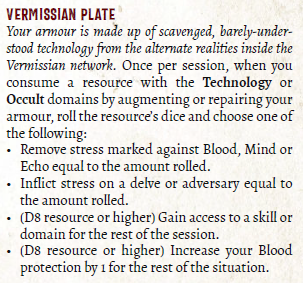
It's expensive, but makes them very versitile.
A Knight's Minor Abilities tend towards protecting yourself or others and tracking and delving around obstacles. They can't get Mind protection - there's just too much wierdness that they're exposed to - but they make up for it by being able to get very good Echo, Blood and Fortune protection; they know how to handle themselves in the City Below.
Major Abilities include; Aetheric Field - discharge the occult energies in your armour once per session, Dragon-Killer - you get a Knight's greatblade which excels at killing anything bigger than yourself, Overclock - you learn how to boost your armour up to and beyond its limits, Trailblazer - increase the amount of stress you inflict on a Delve (and how much it inflicts on you) by forced-marching. Also, and possibly most iconic;
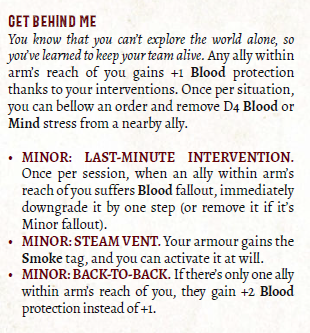
When they hit their Zenith, a knight may learn the location of a unique landmark, dying tragically or ascending to a protective spirit when they reach it, take a heartseed into their armour and body, becoming an engine of destruction (who can be invoked to turn up later by the rest of the party), or learn the rite that summons the Last Train (although it will kill you to call it).
Vermissian Knight Class Breakdown
The Witch
Deep in the City Beneath, in the ruins of a burnt-out and forgotten cathedral, is Hallow. This ramshackle town is where the Witches congregate - carries of a blood-disease that bonds them with the Heart; an occult aristocracy with notable bloodlines and lineages. The disease may eventually kill them, but in the mean time it grants uncanny powers over blood and the creatures of the Heart.
Witches are hard to pin down in terms of their party role - Sorcerer might be the closest, what with the social skills and magical punch, but they're no slouch in a fight. Along with Compel and Occult, they have a pair of core abilities; Crucible let's them roll a d6 against their Echo stress - if it's less, they roll with mastery on their next action, otherwise they take that much stress, and True Form lets them revert to a vicious, bestial horror; terrifying in combat, but bad at anything else (this triggers automatically when they take Major fallout). So maybe Noble/Sorcerer + the Hulk.
This is basically Spire's Blood Witch, but in their natural habitat and without the restrictions placed upon then by having to live in a 'normal' society.
The Witch's Minor Abilities let them ignore fallout, expand the scope of their True Form, read emotions and fix both bodies and objects. They can't get straight Echo protection - they're too open to the energies of the Heart, although even there they can get temporary protection.
In a break from form, the Witch actually has six Major Abilities to choose from; Ascendancy - add the Occult domain to the local area for a scene, Crimson Mirror - see omens in a bloody mirror, Exsanguinate - exactly as you'd expect, Familiar - gain a bonded, warped animal that can soak up stress for you, Great and Terrible - get greater control over your True Form, and;
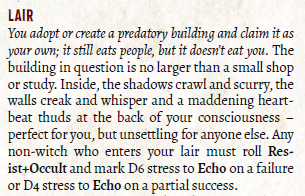
The Zenith abilities are what happens when their status in the City Below, and their mastery of the disease reach a peak; they bond themselves to the landscape, a nightmare creature for a time before fading into a haunting echo, they ascend to dominion over the Witches of Hallow (although after a couple of sessions they'll be interred in the Red Vaults beneath), or...
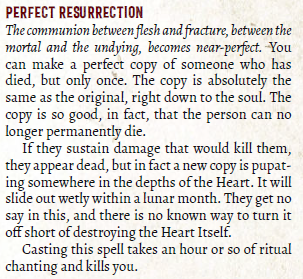
Witch Class Breakdown
Next: Playing and Running the game
The rest of the mechanics
Original SA post
Heart: The City Beneath
08 - The rest of the mechanics
So, on to actually playing Heart. We've gone over the core mechanics, we've seen the tools players can use to interact with the system, but what else is there to see?
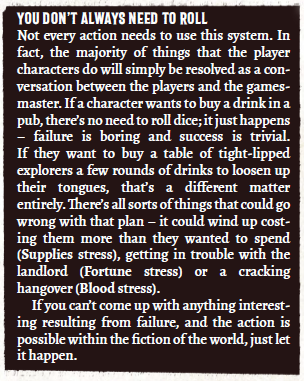
Rolling and Healing
Heart, like Spire before it is goal-orientated - you're not rolling to see if you succeed on an action; the roll is to see how well you do in relation to your current goal; it's subtle, but the idea is to look at what you want to do first, then how your character's skills best apply to the task. The GM is responsibly for setting the stakes - the difficulty (Standard/Risky/Dangerous/Impossible), as well as the possible consequences in terms of Stress. If there's no reason to be mores specific, the latter is based on the Tier - how deep you are in the City Below. The GM is encouraged to make the difficulty and consequences apparent up-front so that players go in knowing the risks.
After a brief foray once more into Fallout - which I talked about a few posts ago - we go into healing it (and stress). In general, this is either done through class abilities - serveral classes can remove one or more types of stress, and some, more major abilities can remove or downgrade fallout - or through resting or buying services from a Haunt. Haunts are locations found in Landmarks (the more static, unchanging parts of the City Below), which can be used to buy equipment or remove forms of stress; but this inevitably requires the expenditure of Resources. The amount of stress recovered is limited by the dice type of the resources you have at hand, and the dice type of the Haunt itself - a ramshackle shelter set up as a doctor's office might be listed as (d6 Blood, d6 Mind), and so could never heal more than d6 stress per visit. Ongoing fallout (i.e. fallout with a long-term effect) can be removed; either a d6 resource spent for Minor fallout, or a d8 for Major fallout.
Critical fallout is usually the end of a character, but it is possible in some circumstances to downgrade it to Major fallout for a d8 resource, if you can get to a Haven with an appropriate Haunt quickly enough. As ever, all of this is in the service of telling a story; fallout is often the opportunity to throw a spanner in the player's plans, complicating them, but not preventing them.
Combat
Like Spire, combat in Heart is presented as any other situation - not just a series of Kill rolls. There's only a couple of special rules to consider; outnumbered players increase the size of the stress dice they suffer, and out-ranging your enemies can put you in a position of safety, reducing the difficulty of rolls, or negating some of the potential stress they inflict.
Likewise, initiative is fairly fast and loose. Generally, the GM will just choose who acts at any one time, based on what makes the most sense, and NPCs are purely reactive; they don't get turns, they just react to what the players do (and may attempt to take advantage of any delays). Options are presented for alternative methods; going round the table in turn, or a player-driven initiative order.
Bonds
Bonds are another mechanic that has survived from Spire, although as there's less of an emphasis on social manipulation and contacts in the City Below, they're somewhat reduced in scope. In Heart, Bonds represent srong relationships with someone (or something) - not necessarily a positive relationship, but not an antagonistic one. Characters can have up to three at any one time, and they act as stress sinks - you can transfer d8 stress to the Bond whenever you visit them. Unfortunately bonds can suffer fallout too - Minor represents minor tasks you need to help them with, Major bond fallout indicates they, or your relationship with them is in serious trouble. Critical bond fallout removes the bond (and may have further repercussions).
As an optional rule you can also get a bond to do stuff for you. They'll take the stress, and roll based on their expertise, and how close the job is to where they live.
The basic use of bonds here is absent in Spire - you just used them to do stuff for you, and the fallout rules are a bit clearer in Heart. Then again, in Heart they're mostly used as stress-dumps, whereas in Spire it was much easier to get rid of stress.
Exploration
So this is what players will be doing a lot of; exploring (newly-unknown) territory, carving paths between scattered points of safety, and delving into the nightmarish unknown. As the Heart itself is a rift where reality itself breaks down, the landscape tends to be pretty fluid, changing behind your back. The pressure of a larger group of people; of their thoughts, beliefs and desires can calcify or scar a place into being more stable - the longer a place is lived in, or the more times a route is followed, the slower or less the likelyhood of changes.
Landmarks are these islands of stability in the City Below and can be used for navigation (insomuch as one can navigate the Heart). Havens are Landmarks that are home to a stable, and at least non-hostile population - this is most often where the party will be able to get rid of unwelcome amounts of stress, heal, re-stock and generally try to forget their predicament.
A journey between two Landmarks is called a Delve, and is statted out a bit like an opposing NPC;
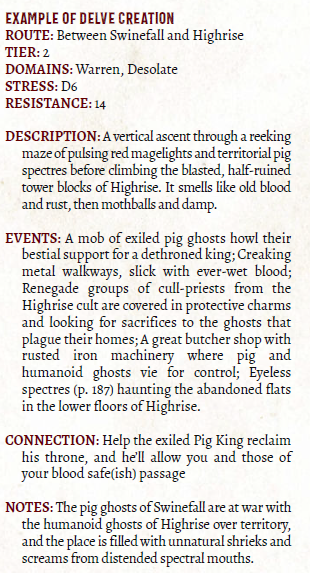
This is the example given in the book - there aren't any other pre-generated delves as the character of each tends to lean heavily on the Landmarks at either end. Tier is how deep (from 0 to 4) the delve takes place, and a given delve may well bridge two Tiers as you go ever deeper. This determines the general difficulty, although sometimes a delve will be easier or harder - having a lower or higher Stress that will be inflicted if the players don't roll well enough.
The Resistance of a delve is an abstraction of how hard-going it is, as well as simply how long it is. The Domains are usually those of the landmarks at either end, and affect what domains players need for those extra dice on their Delve rolls; progress through a given delve is generally a sequence of Delve rolls, although other skills may come into play as usual. Successful rolls inflict stress against the delve's resistance - d4 if you're doing it without gear, but usually d6 or d8 for decent or particuarly good gear - and when this reaches 0, you get to the other end.
Events are the triggers for rolls against the delve; usually the GM will use them to flavour the rolls required, or to create the obstacles the players need to circumvent. Characters can also perform actions that make the journey easier or harder - such as fighting a clutch of monsters - taking these kinds of risk grant Boons, which inflict additional stress on the delve (up to d12 if the players are really clever). Likewise, resting for extended periods, carrying out rituals or getting side-tracked to harvest resources can generate Banes, which remove stress on the delves as the party take more time than necessary, and supplies start to run low.
Finally, Connections are harder tasks that will either incur a significant Bane, or bring the party into conflict with something dangerous. Acheiving this, however, and completing the delve, renders it much more stable and much less dangerous; letting people and goods travel between Havens with relatively little risk.
Spire has no such mechanics, but you can quite easily see how the Delve rules could be applied to any long group endeavour, like casing a joint or gathering blackmail on an authority figure...
The Map
There's a template for this at the back of the book - a blank hex grid, where landmarks and the delves between them should get filled in as a record of the campaign. It's not recommended that the GM pre-plan this too much; it's better to create and evolve it through the course of play (it can also provide a handy source of plot hooks as needed). If you really want to go all the way, RR&D will be selling a pad of maps and landmark/delve stickers soon.
Next: GM Advice, and the World of Heart
GM's Section
Original SA post
Heart: The City Beneath
09 - GM's Section
If this section feels rushed, it's not - it's just there's alot of good advice here, but it's quite hard to get across without writing it out in entirity.
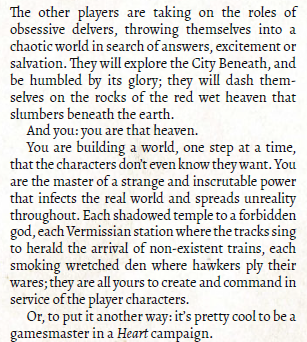
Running the Game
To start off (after that opening blurb), we get the usual 'first time running a game' tips, which is pretty good here; not just concerned with world-building, it also talks about how to arrange games and what everyone should have to hand - the little things that make the experience better. As Heart is a narrative game, it also talks about controlling the pacing and energy of play - players have a lot of agency, and the GM's responsibility is to guide it and make sure the narrative flows smoothly. Then we get into the full list of general tips.
After the general tips, the section has a section for first time story game GMs - as Heart is very much a narrative experience, rather than any kind of simulation. In short; details aren't too important; they only matter when they come in contact with the narrative, and the GM is responsible for working out how the world reacts to the players, rather than being the arbiter of a simulation. Also, importantly, don't plan too much - you don't want too much friction between what you think should happen, and what the players actually do.
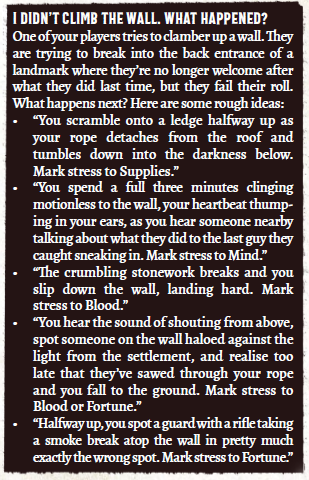
An example of how to adjudicate failed rolls
Finally, we get into advice specific to Heart. In general, you should start with some idea of the framing for the campaign - the default setting is a ragtag group of explorers, but there's several other suggestions; setting up a City Below trading company, defending a Haven, intelligences agents burnt by their handlers (this last one will be feature in one of the upcoming sourcebooks). But the key thing is to give the player's actions weight - if they do something, the world should react and quite possibly change as a result.
In play, as a GM your job is to ask questions of the players - let them add flavour to the world around them, and generally give up any kind of firm control (it's easier that way - the GM is never really in control at the best of times; just roll with it). Also take a note of their answers - if there's little tidbits either you or the players come up with, keep them and re-use them; it makes the evocation of the world easier if there's a few familiar or remembered elements.
Atmosphere in Heart is important; it's a horrific nightmare-place, but there's people - actual normal people - trying to make a living there; however tragic their lives are, they're alive, and it's possibly better than what it was before. The City Below is a terrifying, but wondrous place; the Heart isn't directly malevolant per se, and deep down you might wander through a parasite heaven, or an impossible three-dimensional turntable at the heart of the Vermissian. Things get strange down there.
Tension in the game is also important - this is, essentially a horror game - but it's not something anyone can sustain. Let the players joke, let them break the tension every so often and use that as a contrast with the more distressing elements (and it should be noted, this game is fully up front about use of the X card, and Lines and Veils - there's quite a lot here which could be quite upsetting if it's sprung on players without warning).
Fundementally, your job is to give players what they want. If they have a skill or a domain, let them use it. If the Vermissian Knight takes Dragon Killer then give them something big and nasty to kill. The players' Callings and the Beats they choose are key here - when they're picking Beats at creation, or at the end of a session, these should be the heart of any planning for the next session - if they want to take Blood fallout, include a fight, if they need to claim a valuable resource, give them the opportunity to steal or otherwise acquire one.
Zenith beats bear special mention, as these are the culmination of a character's arc; their redemption or downfall, and should provide a satisfying resolution (if they don't succumb to Critical fallout before then). Ideally players should have an idea of what Zenith beat and ability they're aiming towards after a few sessions; as a GM you should take this into account as you plot the campaign forwards. Characters aren't disposable in Heart, but they're not going to around for years of play; they're supposed to die or otherwise end. And the campaign shouldn't go on forever - the suggestion is about eight linked games (not sessions, I think, but think plotlines/adventures; it's a bit vague); after that it might be time to call time on the campaign, either for a break or a fresh start.
The rest of the chapter is on general mechanical advice; NPC creation (give them distinct traits and mannerisms, steal from pop culture, don't be afraid to kill them off), Combat - adverseries and players should always have an out; pretty much no-one is going to be fighting to the death, and player should have plenty of information up front. Fights should be about something - the skill is Kill after all, and that infers some kind of stake - and consequences are often brutal. Landmarks and delves can (and should) be freely tweaked to fit the campaign - the list in the book are suggestions, not canon.
Oh, and every GM is terrified of screwing up, but this is normal and might never go away, so try to have fun doing it.
Next: The Setting (finally)